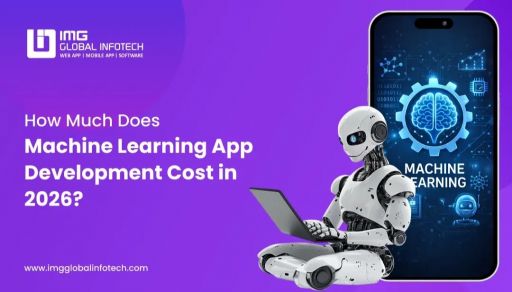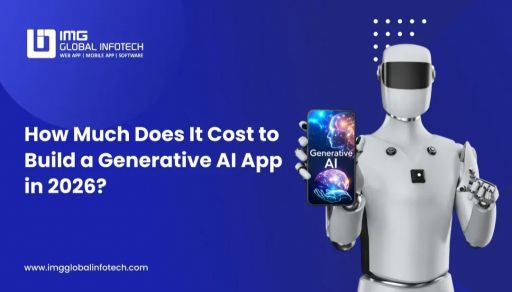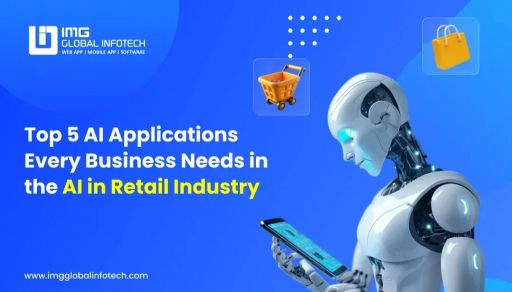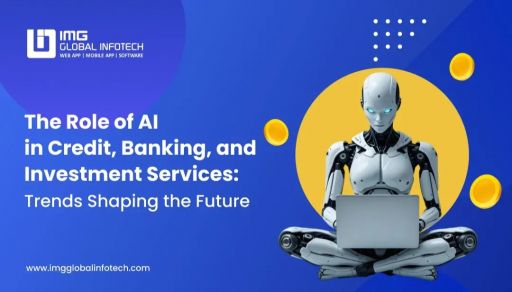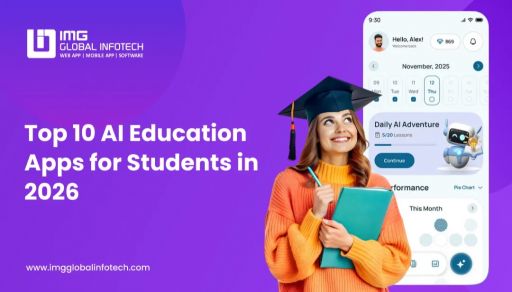AI In Food Industry: Benefits And Use Cases
Dipti Singhal
Jul 01, 2025

The food industry is digitally transforming and Artificial Intelligence (AI) is paving the way through all facets of the food system, including smart farming or farming bots, automated food processing, personalized nutrition, and enhancing supply chains. AI is influencing every step of our food journey, through how they are produced, packaged, to how we consume food. As consumer expectations increase, food safety concerns rise, and the environment demands our attention, it is increasingly difficult for food businesses to remain competitive without leveraging AI. Implementing AI leads to faster decisions, less food waste, improved food quality, and the potential to improve a business's operations. As the global food industry continues to change, there are many astonishing opportunities to implement AI in food industry. In this blog post we will cover the main applications, advantages, real world implementation and future potential of AI in the food industry.
What is AI in Food Industry?
AI in food industry means using technologies like machine learning, computer vision and data analytics to enable automated efficiencies. AI promotes efficiencies at every step from farm to fork, supporting better precision agriculture, production efficiencies, quality control (reduce recalls or remakes), operations management and supply chain management. Ultimately this all leads to better decisions and product quality, less waste, better food safety, personalized nutrition, and better customer experience to support sustainability and foster innovation.
Related Post - How To Start A Food Business? Profitable Food Business Ideas
Role of AI in the Global Food Market
Artificial Intelligence (AI) is transforming the food market around the world, creating smarter, safer and more sustainable food markets. role of artificial intelligence in food industry from farm to table in these 7 ways:
Precision Agriculture:
AI can assist farmers in optimizing crop yields by using data from sensors, drones, and satellite images. AI in food industry also carbon and fuel emissions, predict and examine environmental changes, suggest planting times, the need for tillage, and irrigation time.
Supply Chain Optimization:
AI is enabling the examination and tracking of the entire supply chain as it evolves within the supply chain, and identifying ways to reduce delays, waste, and improve logistics. Agility from better tracking, reduced time to market freshness, and enhancing user experience in inventory management.
Food Quality Control and Safety:
AI in food industry is capable of identifying contaminated items, monitoring sanitation conditions, and ensuring consistent quality in processing plants, by learning machine learning through data analysis and computer decision user interface and visibility.
Consumer Behavior Analysis:
AI in food technology can analyze buying locations and patterns from social media and online reviews and allow brands to create more personalized experiences for marketing. Develop product portfolios around formats/multiplier and neighborhood demand.
Robotic Automation:
AI robots are making some processes more efficient and consistent: robotic arms to identify and sort fruit and vegetables, automated cooking and grilling systems to produce fast, fresh options in restaurants; reactions from AI applications and systems have resulted in fast food production time/response.
Sustainable Practices/Waste Reduction:
AI in food industry can find better work flows that support sustainable practices by minimizing water use, and repurposing wasted food, tracking expired and unused food.
Alternative Food Innovation:
AI is speeding up research and development of plant-based and lab-grown alternatives by replicating taste and texture profiles and nutrition attributes in a more accessible manner for consumers to embrace sustainable diets.
Also Read - How Much Does Food Delivery App Development Cost?
Some Applications Of AI In The Food Sector
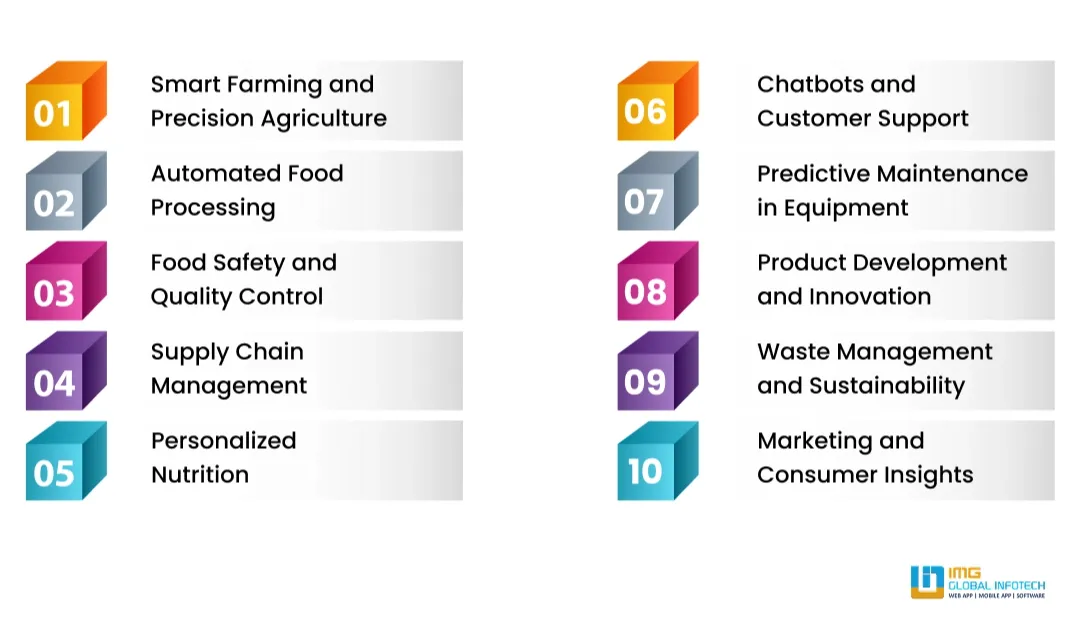
Artificial intelligence (AI) is transforming the food industry in ways that enhance efficiency, improve product quality, and offer innovative food solutions. Here are some of the major applications of AI in food industry:
Smart Farming and Precision Agriculture
AI uses sensors, drones, and satellite images to monitor crop health, soil quality, and weather to enable farmers to make data-driven decisions to maximize crop yield while minimizing resource waste.
Automated Food Processing
AI-enabled robots and intelligent machines are being deployed in food manufacturing units. These robots include robotic arms that repackage food, as well as AI applications for sorting or grading food and packaging food products. They provide consistency, accuracy, and speed in volume production processes.
Food Safety and Quality Control
The impact of AI in food industry uses advanced computer vision and machine learning algorithms to detect contaminants (including colour differences), monitor hygiene, and check product quality at early, intermediate, or final stages of processing. This could lower risks and facilitate compliance with food safety regulations.
Supply Chain Management
AI enhances the visibility of supply chains by enabling stakeholders to manage and track devices, warehouse inventory levels, predict demand, and utilize Business Intelligence for delivery route optimizations. AI in fast food industry can help reduce the spoilage of food products, the carbon footprint of supply chains, transportation costs, and almost guarantee that products arrive at their destination on time.
Personalized Nutrition
Use of AI in food industry can analyze a person's personal health data, habits, and preferences to recommend personalized diet plans. This allows food companies to deliver personalized and health-conscious food products.
Chatbots and Customer Support
AI-based chatbots are being employed by Food Delivery App, restaurants, and retailers, for handling customer inquiries, taking orders, and providing recommendations, in a better customer experience.
Predictive Maintenance in Equipment
Use of artificial intelligence in food industry can track the functionality of machinery inside of food-production plants. It can predict that the machine is going to stop working ahead of time, thus organizations can intervene to have the machine serviced ahead of time, limiting downtime.
Product Development and Innovation
AI facilitates the simulation of flavor combinations, ingredient interactions, and nutritional profiles. In addition to making it faster to create new food products, it is becoming increasingly important in the context of plant-based food products and lab-grown foods.
Waste Management and Sustainability
AI can find inefficiencies throughout the supply chain to reduce food loss and food waste. AI can also suggest alternatives that are environmentally friendly and suggest sustainable methods of production and packaging.
Marketing and Consumer Insights
AI is capable of monitoring consumer behavior, analyzing social media trends, and gauging feedback to support understanding of consumer preferences, and making indicators of future market trends visible. In turn, this helps to position more effective marketing campaigns and more strategic ways of getting products into customers' hands.
Related Post - Leading Food Delivery App Development Companies In USA 2026
Benefits of AI Integration in the Food Industry
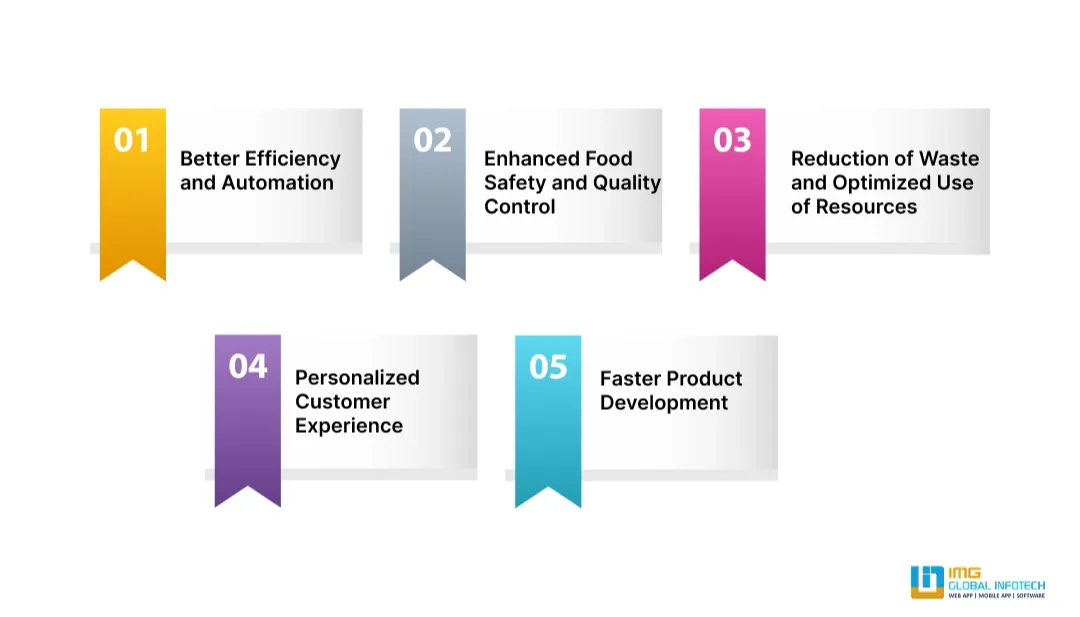
The use of Artificial Intelligence (AI) in the food industry is revolutionizing technology by optimizing operations, improving quality, and promoting sustainable practices. Here are five positive aspects of using ai in Food app development
Better Efficiency and Automation
Machine learning for food industry is automating repetitive and mundane tasks in food processing and packaging, and sorting. Intelligent machines can perform better in speed and accuracy than humans, thus cutting down labor costs, human error, and improving batch productivity while automating operations in the food supply chain.
Enhanced Food Safety and Quality Control
AI-powered computer vision systems can detect contaminants, evaluate product quality, and ensure hygiene in food processing plants. AI can inspect thousands of products every minute, which can eliminate possible health risks, ensuring consistent product quality which is very important for consumer safety.
Reduction of Waste and Optimized Use of Resources
The application of ai in food industry is used to forecast demand, monitor expiration, and alert inefficiencies related to storage or transportation. The aim being to limit over-production and spoilage, food via waste is reducible while better use of resources (Water, Energy & Raw Materials) can also be employed
Personalized Customer Experience
AI food production uses consumer preferences and behavior to provide a personalized, customer experience (food recommendations, diet plans, targeted marketing). Food and beverage are highly personalized businesses based on individual needs and trends, but with increasing competition, customer retention, and loyalty are more important than ever.
Faster Product Development
AI will help food and beverage producers to make much more rapid decisions, often through modeling based on mixing ingredients, flavors and nutritional data. It is especially useful for new and trending products like plant-based and alternative proteins.
Also Read - How Much Does It Cost To Develop An App Like DoorDash
Examples of Food Brands Using AI in Their Business
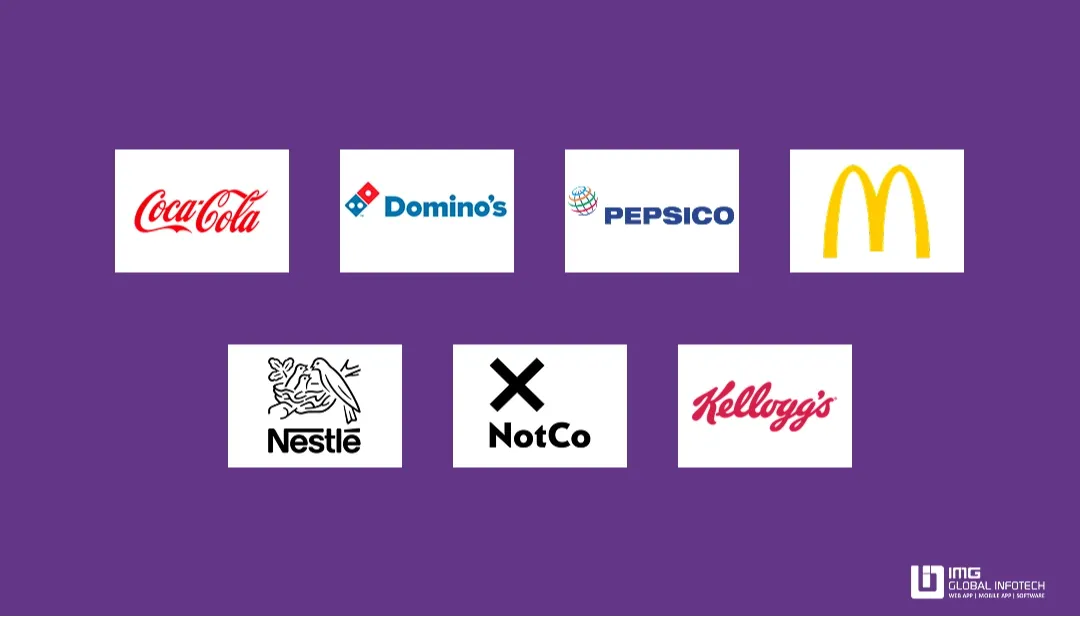
These AI development frameworks illustrate how some of the world's largest food brands are using AI in their product innovations, customer experience improvements, and operations improvements - all relevant to the future of food.
Coca-Cola
Coca-Cola applies AI by analyzing social media and customer information data for product development. The company developed Coca-Cola Cherry Sprite after monitoring consumer flavor preferences through social media channels. Coca-Cola has also incorporated artificial intelligence in food processing into their vending machines with customized promotions based on the user.
Domino's Pizza
Domino's offers an AI-powered chatbot called "Dom" as an order taking mechanism, and has created voice recognition technology within their app placed on the company smartphone. This AI chatbot development uses predictive algorithms for delivery, and also has uses for AI to check the quality of pizza before dispatching.
PepsiCo
PepsiCo has implemented AI into its demand forecasting and to enhance and improve the efficiency of its supply chain. For example, through machine learning the company scans store shelves to optimize its stocking process. It also uses AI to monitor consumer preference trends for product innovation.
McDonald’s
McDonald’s purchased Dynamic Yield, an artificial intelligence (AI) firm, in an effort to change the way we experience their drive-thrus by personalizing their menus based on time of day, the weather, and what is trending. Essentially, AI enables firms to optimize menus in real-time while also enhancing the customer's experience.
Nestlé
Nestlé has numerous ways in, but on their website, they mention deploying AI to speed up product development, adjust and minimize sugar quantity in recipes through data simulation, and provide personalized nutrition advice through its wellness apps. Nestlé also makes use of AI for predictive maintenance in its factories globally.
NotCo
Chilean food-tech brand NotCo leverages an AI algorithm called, "Giuseppe" to examine plant-based ingredients and mimic the taste and texture of animal-based foods. The company has numerous products, including NotMilk and NotBurger.
Kellogg's
Kellogg's engaged an AI firm by the name of Visual Insights to study in-store foot traffic with images, as well as optimize placements of their cereals and snacks. Because of this project, the products were given more visibility in the store, allowing Kellogg's to improve sales in that segment.
Challenges of Food Businesses Implementing Artificial Intelligence
Although there are challenges, in the event food businesses can prepare, plan, partner, and select suitable paths - they can leverage AI in food production while reducing risk and agility, while creating disruption to their operations.
High Initial Investment
One significant hurdle to implement AI solutions is that it demands significant upfront spend on technology, infrastructure, and skilled people. Smaller and medium food businesses may find it hard to justify or recognize the expense without realizing value (ROI) back in an impossible timeframe.
Data Quality and Integration Issues
Machine learning in food industry is dependent on data that is consistent and high quality. There is a common problem in food businesses when it comes to data, they might have a lot of data but it is often in an unstructured format, or siloed in different departments. This makes it very difficult to integrate systems and produce informed insight.
Descriptors:
Many food companies do not have any sort of in-house AI for food industry knowledge, or training, in order to properly manage and operate machine learning based AI systems. This means they are dependent on outside vendors, and slows down some adoption, training and troubleshooting processes.
Related Post - Developing A Food Delivery App Like Talabat: Step-by-Step Guide
Why Should Food Companies Start Investing in AI Today?
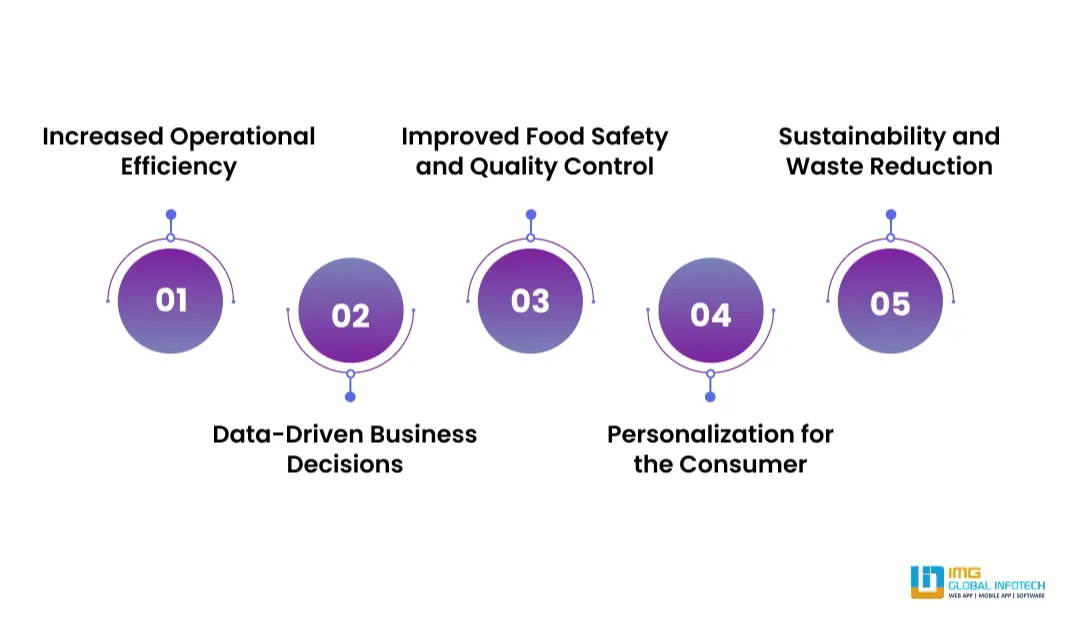
If you are someone who loves to get updated with AI development trends you must want to build something for the future. AI is no longer a luxury, it is a strategy. Investing in food manufacturing today will position food companies for sustainable growth, innovation, and long term success.
Increased Operational Efficiency
AI can be helpful in automating repetitive tasks that are often time-consuming and tedious such as sorting, packaging, keeping track of inventory, and demand forecasting. The productivity gains associated with uses of ai in food industry are greater than proprietary systems because humans are most productive when they are not weighed down by rote work. In some respects, this could have multiple impacts on productivity in that it reduces human error, and allows companies to reassign people to more strategic roles, which overall increases profits.
Data-Driven Business Decisions
challenges for ai in food industry and machine learning will enable food companies to use and analyze a large amount of data from their production lines, sales data, and customer feedback, to make more nimble and intelligent decisions around product development, marketing strategies, and supply chain, and give business a competitive advantage in a saturated market.
Improved Food Safety and Quality Control
AI software development visual inspection technologies can identify contamination, defects or anomalies in food products more accurately than a human worker. This ensures consistent quality and adherence to applicable health regulations, while reducing the potential for expensive recalls or damage to reputation.
Personalization for the Consumer
Application of AI in food industry provides a foundation for businesses to deliver personalized product recommendations, promotions and dietary plans which are specific to the consumer based upon their interests, preferences and behaviours. This inculcates a richer customer relationship through increased satisfaction and enhanced brand loyalty.
Sustainability and Waste Reduction
ai in food and beverage industry aids in the identification of waste within production and supply chains. The identification of waste and irreparable defects enables companies to lessen food waste, optimize limited energy and water usage, and execute more sustainable practices. These efforts promote sustainability and benefit a company's brand and the environment, as well as reduce costs in the long term.
Conclusion
In conclusion,aid in food industry in india is by improving efficiency, safety, personalization, and sustainability. With the willingness of some businesses to embrace innovation and evolution, the use of AI is no longer merely an option but is essential for almost all aspects of the food industry value chain. At IMG Global Infotech, our AI development company specialize in AI-enabled development solutions for the food industry with the toolset to leverage smart automation capabilities or cloud-based data analytics. Our service offerings help ensure that your place in the food industry is competitive and forward-thinking in one of the most rapidly responsive industries.
-
 How to Build a Jewelry E-commerce Website Like CaratLane?
How to Build a Jewelry E-commerce Website Like CaratLane?
-
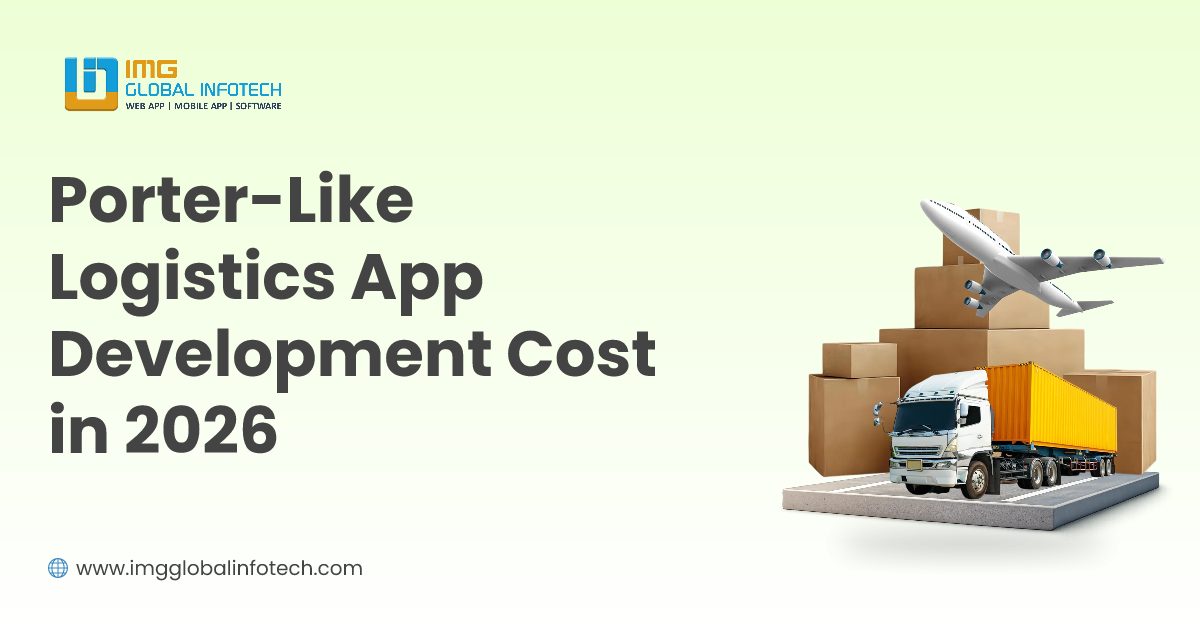 Porter-Like Logistics App Development Cost in 2026
Porter-Like Logistics App Development Cost in 2026
-
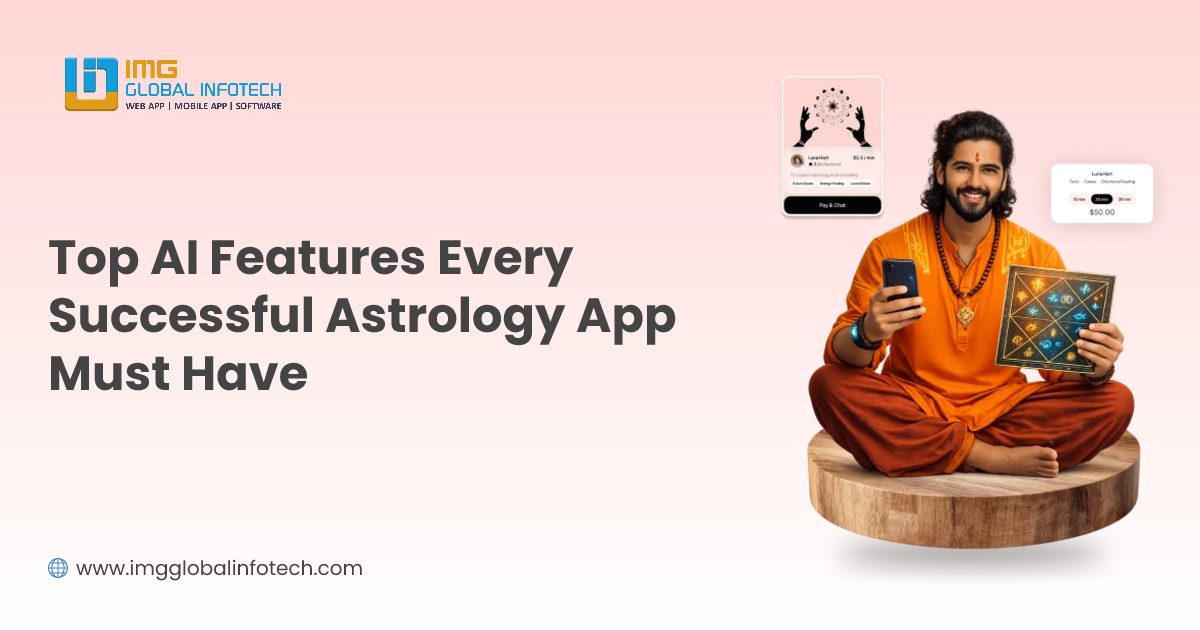 Top AI Features Every Successful Astrology App Must Have
Top AI Features Every Successful Astrology App Must Have
-
 What Are the Top Ecommerce Development Trends to Watch in 2026?
What Are the Top Ecommerce Development Trends to Watch in 2026?
-
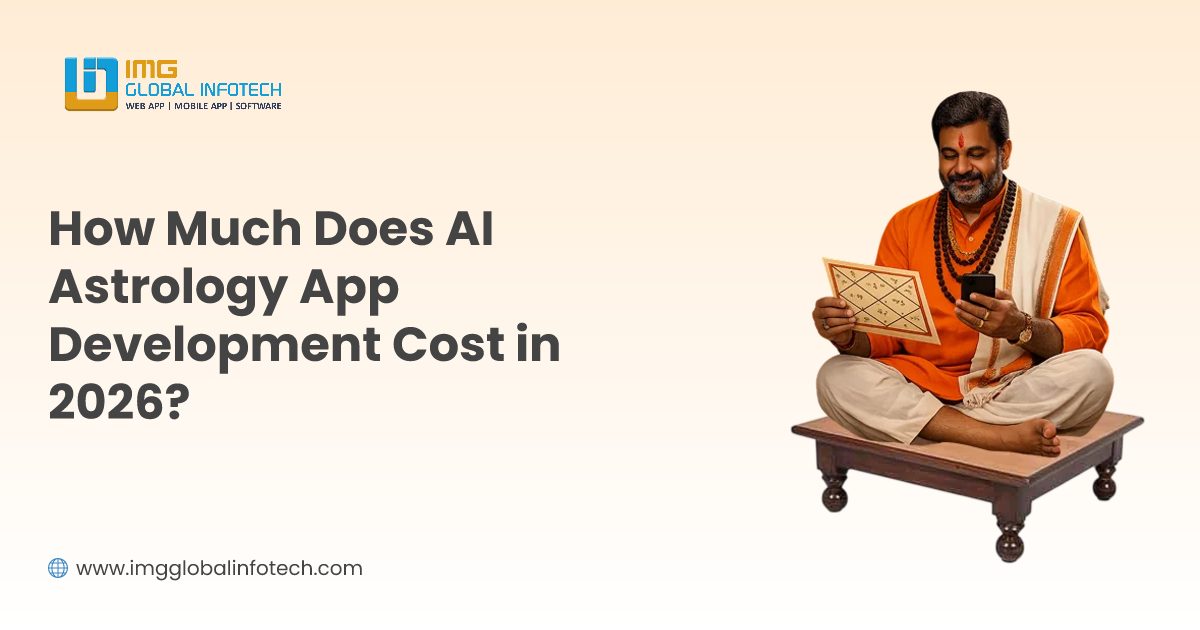 How Much Does AI Astrology App Development Cost in 2026?
How Much Does AI Astrology App Development Cost in 2026?
-
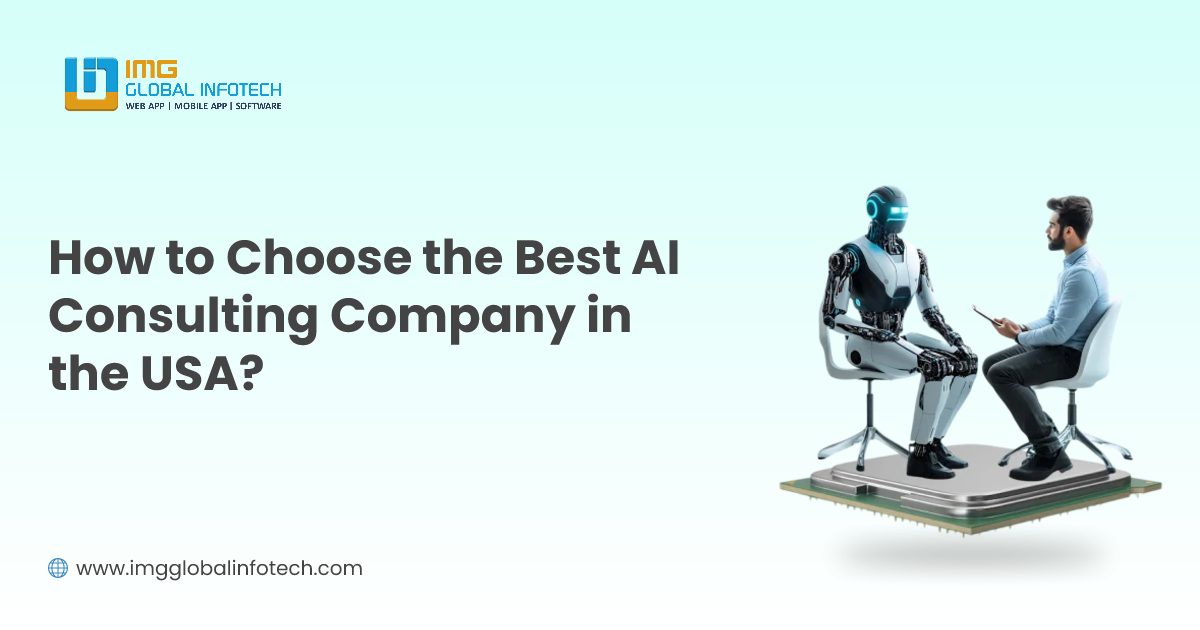 How to Choose the Right AI Consulting Company in the USA?
How to Choose the Right AI Consulting Company in the USA?
Dipti Singhal is a skilled Content Writing Specialist at IMG Global Infotech, with strong expertise in creating engaging, SEO-optimized content for various industries. She focuses on blending storytelling with effective keyword strategies to help businesses connect with their audience and improve their online visibility. Passionate about delivering high-quality content that drives real results, Dipti plays an essential role in strengthening the company’s digital presence.


